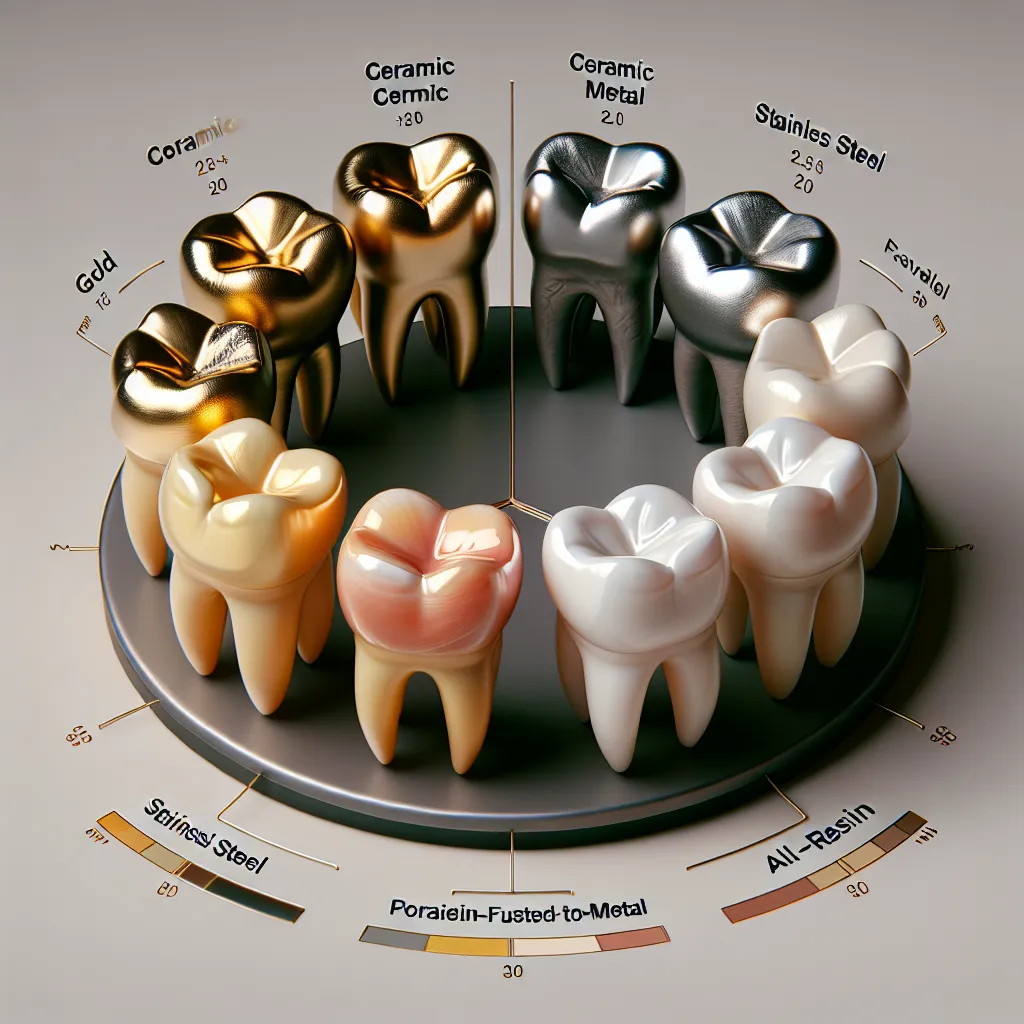
Exploring Types of Dental Crowns and Their Durability
When it comes to dental crowns, understanding the various types available and their durability is essential for making informed decisions about your oral health. From discussing the different materials used in dental crowns to exploring the factors that impact their longevity, this article delves into the world of dental restorations to help you choose the most durable option for a lasting and healthy smile.
Different Types of Dental Crowns
When it comes to dental crowns, there are several types available, each with its unique characteristics and durability. Let’s explore the different types of dental crowns and their specific features:
1. Porcelain Crowns
Porcelain crowns are known for their natural appearance, making them a popular choice for front teeth. They are quite durable and resistant to staining, offering a cosmetically appealing option for patients looking to improve their smile.
2. Ceramic Crowns
Ceramic crowns are metal-free and provide a strong, natural-looking alternative to traditional metal crowns. They are ideal for patients with metal allergies and those seeking a more aesthetically pleasing option. Ceramic crowns are durable and blend seamlessly with natural teeth.
3. Metal Crowns
Metal crowns, often made of gold or other alloys, are known for their strength and longevity. While they may not be as aesthetically pleasing as porcelain or ceramic crowns, metal crowns are highly durable and suitable for teeth that undergo significant pressure from chewing.
4. Porcelain-Fused-to-Metal Crowns
Porcelain-fused-to-metal crowns combine the strength of metal with the natural appearance of porcelain. These crowns are versatile and can be used for both front and back teeth. They offer a balance between aesthetics and durability, making them a popular choice among patients.
5. All-Resin Crowns
All-resin crowns are an affordable option but are less durable compared to other types of crowns. They are more prone to fractures and wear over time, making them better suited for temporary crowns or for patients with minimal chewing pressure on the teeth.
Factors Affecting the Durability of Dental Crowns
When it comes to the longevity of dental crowns, several factors play a critical role in determining how durable they will be over time. Let’s delve into the various aspects that can influence the durability of dental crowns.
1. Material Selection
One of the key factors affecting the durability of dental crowns is the material used in their construction. Different materials, such as porcelain, ceramic, metal, or a combination of these, offer varying levels of strength and resilience. The choice of material should align with the individual’s oral health needs and lifestyle to ensure long-lasting results.
2. Proper Fit and Installation
The precise fit of a dental crown and the accuracy of its installation are paramount in ensuring its durability. A well-fitted crown not only enhances comfort but also reduces the risk of damage or premature wear. Professional installation by a skilled dentist is essential to guarantee the longevity of the dental crown.
3. Oral Care and Hygiene
Maintaining good oral hygiene practices is crucial for the durability of dental crowns. Regular brushing, flossing, and routine dental check-ups help prevent decay, gum disease, and other oral health issues that could compromise the integrity of the crown. Proper care and maintenance significantly impact the longevity of dental restorations.
4. Occlusal Forces and Habits
The forces exerted during chewing and any habits like teeth grinding or clenching can affect the durability of dental crowns. Excessive force or stress on the crowns can lead to fractures or damage over time. Dentists may recommend mouth guards or other strategies to mitigate the impact of occlusal forces on the crowns.
5. Overall Oral Health
The overall health of the mouth, including the condition of surrounding teeth and gum tissues, can influence the durability of dental crowns. Addressing any underlying issues, such as periodontal disease or tooth decay, is essential for maintaining the longevity of the crowns and ensuring optimal oral health.
Choosing the Most Durable Dental Crown for Long-term Success
When it comes to dental crowns, durability is a key factor to consider for long-term success. Different types of dental crowns offer varying levels of durability, each with its own strengths and weaknesses. Understanding the options available and their durability can help you make an informed decision about the most suitable choice for your specific needs.
1. Ceramic Crowns: Aesthetic Appeal with Moderate Durability
1) Ceramic crowns are popular for their natural look that mimics real teeth, making them a top choice for front teeth. However, they are prone to chipping and may not be as durable as other materials, especially for individuals with heavy bite forces.
2. Porcelain-Fused-to-Metal Crowns: Balance of Strength and Aesthetics
2) Porcelain-fused-to-metal crowns combine the strength of metal with the aesthetics of porcelain. While they offer good durability and a natural appearance, the metal layer may sometimes show as a dark line near the gum line, affecting aesthetics.
3. Gold Alloy Crowns: Superior Durability with a Metallic Finish
3) Gold alloy crowns are known for their exceptional strength and longevity. They are highly resistant to wear and fracture, making them a reliable choice for back teeth. However, their metallic color may not be desirable for visible areas in the mouth.
4. Zirconia Crowns: Excellent Durability and Biocompatibility
4) Zirconia crowns are incredibly durable and biocompatible, making them a preferred option for those with metal allergies. They offer superior strength and are highly resistant to chipping and cracking, ensuring long-lasting performance.
5. Resin Crowns: Affordable Option with Limited Durability
5) Resin crowns are a budget-friendly choice but tend to have the lowest durability compared to other materials. They are more prone to wear and may need to be replaced sooner than other crown types, especially for individuals with stronger biting forces.